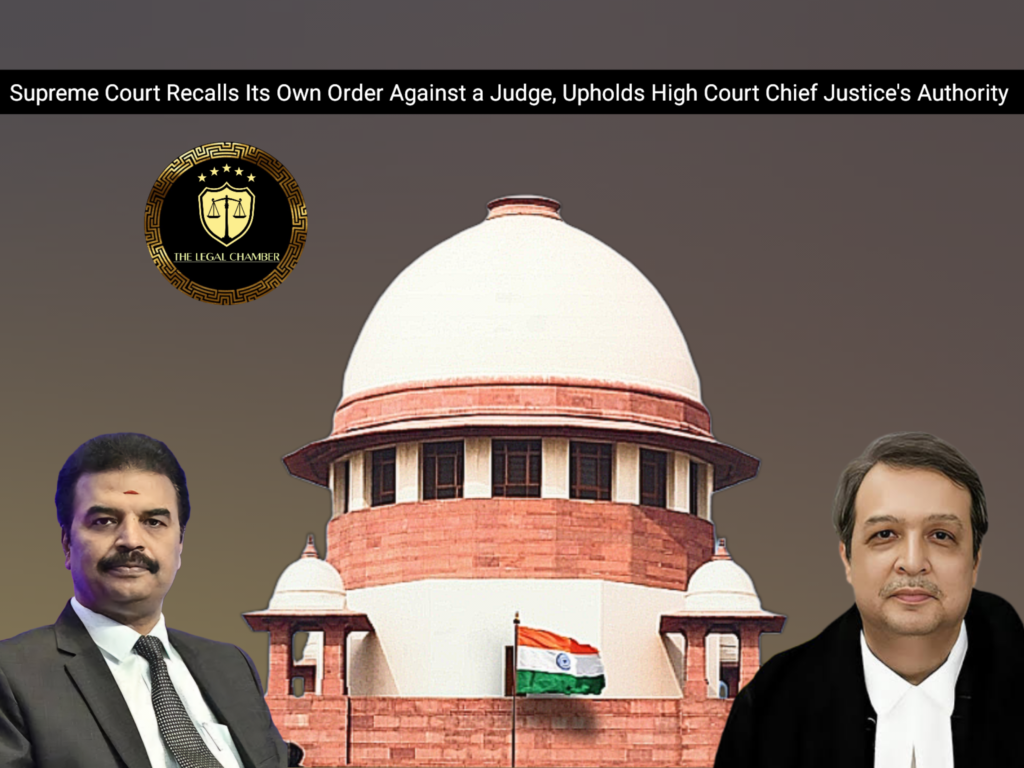
Facts Of The Case:
The case originated from a Special Leave Petition filed by M/s Shikhar Chemicals challenging an order passed by the Allahabad High Court. The Supreme Court, in its order dated 4th August 2025, found the High Court’s judgment to be erroneous. Consequently, it set aside the impugned order and remanded the matter back to the High Court for a fresh consideration on the merits. The apex court’s directive included a request for the Chief Justice of the Allahabad High Court to assign the case to a different judge. Crucially, the Supreme Court also issued strong administrative directions, ordering that the judge responsible for the erroneous order should not handle any criminal cases alone until demitting office and should instead be placed in a division bench with a senior judge. This unprecedented step was justified by the Court’s observation that this was not an isolated incident but part of a pattern of many such erroneous orders from the same judge examined over time. The trigger for the subsequent hearing was an undated letter from the Chief Justice of India, requesting a reconsideration of these specific administrative directions, leading the Supreme Court to re-notify the case.
Procedural History:
The procedural history of this case commenced with the filing of a Special Leave Petition (Crl.) No. 11445/2025 before the Supreme Court of India, challenging an order from the Allahabad High Court. On 4th August 2025, the Supreme Court partly allowed the petition, setting aside the High Court’s impugned judgment and remanding the matter for fresh consideration. In the same order, the Court issued specific administrative directions concerning the concerned High Court judge. Subsequently, the Hon’ble Chief Justice of India sent an undated letter requesting a reconsideration of those directions. This prompted the Supreme Court to re-notify the matter. In the hearing that followed, the Court upheld its decision on the remand but, in deference to the CJI’s request, deleted the contentious administrative directions from its final order dated 8th August 2025.
READ ALSO:Supreme Court Ruling: Family of US-Based Driver Wins Enhanced Compensation
Court Observation:
In its observations, the Supreme Court clarified that its intent was not to embarrass the individual judge but to act out of constitutional duty to protect the institution’s dignity when faced with a pattern of legally erroneous orders that jeopardized the rule of law. The Court emphasized that High Courts are not separate islands and that it is compelled to intervene in its appellate jurisdiction under Article 136 when institutional concerns affecting justice delivery arise. It noted that for the vast majority of litigants, the High Court is the final court, making the quality of its orders paramount for maintaining public faith. While acknowledging the Chief Justice of a High Court as the master of the roster, the Court asserted its authority to take corrective steps to uphold the judiciary’s credibility, even as it subsequently deleted the specific administrative directions out of deference to the request of the Chief Justice of India.
Final Decision & Judgement:
The Supreme Court partly allowed the Special Leave Petition and set aside the impugned judgment of the Allahabad High Court, remanding the matter for a fresh consideration on merits by a different bench. While the Court upheld its core judicial decision to remand the case, it modified its original order by deleting the specific administrative directions (Paras 25 & 26) that had restricted the concerned judge from hearing criminal matters. This deletion was made in deference to a written request from the Hon’ble Chief Justice of India, reaffirming the administrative authority of the Chief Justice of the High Court as the master of the roster. The final judgement, dated 8th August 2025, thus balanced the Court’s supervisory role with respect for the High Court’s administrative autonomy while strongly reiterating the imperative for all courts to uphold the rule of law and maintain institutional credibility.
Case Details:
Case Title:M/S. Shikhar Chemicals vs. The State of Uttar Pradesh & Anr. Citation: 2025 INSC 945 Appeal Number: Petition for Special Leave to Appeal (Crl.) No. 11445 of 2025 Date of Judgement: 8th August, 2025 Judges/Justice Name: Justice J.B. Pardiwala and Justice R. Mahadevan
Download The Judgement Here